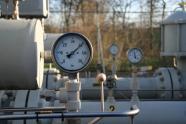Gas To Dominate Generation
More Than A Bridge Fuel, Aubrey McClendon Says

Natural gas continues to loom large over America's energy sector, with abundant supplies affecting every aspect of the industry. Natural gas-fired generation will represent 82 percent of generation capacity additions in the power sector in 2013, the government has just reported. To better understand the factors shaping the gas industry, EnergyBiz Insider recently interviewed Aubrey McClendon, chief executive of Chesapeake Energy, the second-largerst producer of natural gas and most active driller in the United States, according to its website.
EnergyBiz: Is natural gas a
bridge fuel to get us to future energy sources that
emit less carbon?
McClendon: I would object to the
characterization of natural gas as a bridge fuel.
We've been using it in this country since 1850. It's
been a very important part of our energy future, and
it will be for at least the next hundred years, so
it way more than a bridge fuel. It's a foundation
fuel.
EnergyBiz: Your view of global
warming?
McClendon: I don't really think the
science is probably settled, but I don't think it
matters. It's not something that we ought to take a
risk with. We know CO2 concentrations are
increasing, and we know there are ways to prevent
that and so we ought to. Ancillary benefits
would be that fewer other pollutants such as mercury
would get into the system through burning coal.
EnergyBiz: Natural gas has half the
CO2 emissions of coal, so it will get us down the
road until we can rely more on nuclear and
renewables.
McClendon: My view is half is a
pretty substantial reduction, and of course natural
gas is cheaper than oil and we've been competitive
with coal on price the past few years, and that's
without pricing all of coal's social costs. The
world is not going to go to zero carbon emissions,
so a roll back by 50 percent would be substantial.
The nuclear game is going to be a hard one to play.
They're pretty expensive and take 10 years to build.
Any nuclear building over the next 20 or 30 years is
probably just going to replace what we have that is
depreciating away every year. Renewables are
probably never going to be more than 15 percent of
the grid. So you're either going to have to clean up
coal or you're going to have to burn more gas, and
right now the technology for cleaning up coal looks
like an insurmountable technological and economic
challenge. Gas is ready to pick up more load right
now.
EnergyBiz: Natural gas provides
about 20 percent of our generation. Do you see that
growing?
McClendon: Over time it could double. The gas is
there. We consume about 60 billion cubic feet of gas
per day in the United States and about one-third of
that goes to meet power needs. Coal produces 50
percent of our power and to imagine that natural gas
replaces all of coal is probably unrealistic in the
near term. However, we should take a look at
the coal plants that are the dirtiest 25 to 35
percent - the plants that are 30, 40, 50 years old
and should be taken down. There's more gas-fired
power generation capability in this country than
there is coal-fired capability, but coal
plants run about 80 percent of the time while gas
plants only run about 25 percent of the time. You do
not have to spend a lot of money retrofitting coal
plants. You just need to turn the dirty coal plants
off and turn on your clean natural gas plants for
longer periods of time.
EnergyBiz: Are you hiring?
McClendon: You bet. In the last
year our net growth was about 700 employees. Our
average compensation is around $100,000 a year.
These are some of the very best jobs America has to
offer.
Copyright © 1996-2010 by CyberTech, Inc. All rights reserved.
To subscribe or visit go to: http://www.energycentral.com
To subscribe or visit go to: http://www.energybiz.com